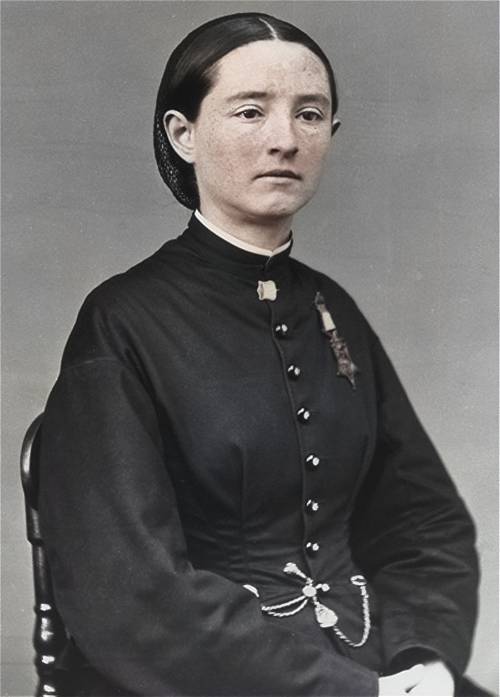
FAQ About Mary Edwards Walker

Who was Mary Edwards Walker?
Mary Edwards Walker was a prominent 19th-century American physician, surgeon, and women's rights advocate. She is historically significant for being the only woman to receive the Medal of Honor for her contributions during the American Civil War. Walker was also an outspoken advocate for gender equality, dress reform, and social justice.

What did Mary Edwards Walker do during the American Civil War?
During the American Civil War, Mary Edwards Walker served as a contract surgeon for the Union Army. She was known for her dedication and bravery, often crossing battle lines to treat wounded soldiers. Walker was captured by Confederate forces and was held as a prisoner of war for several months. Her efforts were later recognized by awarding her the Medal of Honor.

Why is Mary Edwards Walker the only woman to have received the Medal of Honor?
Mary Edwards Walker received the Medal of Honor in 1865 for her exceptional services as a surgeon during the American Civil War. She remains the only woman to have received the award because it was later rescinded in 1917, along with many others, when the criteria for the Medal were revised. However, she continued to wear the medal until her death, and it was posthumously reinstated in 1977.

What contributions did Mary Edwards Walker make to women's rights?
Mary Edwards Walker was a fervent advocate for women's rights throughout her life. She pushed for dress reform, famously advocating for women to have the right to wear trousers, which was part of a broader movement for gender equality. Walker was also a vocal supporter of women's suffrage, working tirelessly to secure voting rights for women.

How did Mary Edwards Walker's views on dress reform impact society?
Mary Edwards Walker's views on dress reform were quite ahead of her time. She rejected the restrictive garments typically worn by women in favor of more practical attire, including trousers. Her advocacy challenged societal norms and contributed to the broader movement for women's rights, encouraging women to seek the freedom to choose their clothing.

Was Mary Edwards Walker recognized during her lifetime for her accomplishments?
Mary Edwards Walker did receive recognition during her lifetime, notably for her service during the Civil War with the awarding of the Medal of Honor. However, her progressive ideas and unconventional lifestyle often led to her being marginalized by mainstream society. She was an iconic figure among early feminists, but much of her impact was more widely recognized posthumously.

What challenges did Mary Edwards Walker face as a female physician in the 19th century?
As a female physician in the 19th century, Mary Edwards Walker faced significant challenges, including gender-based discrimination and skepticism from male colleagues. Medicine was overwhelmingly male-dominated when Walker began practicing, and she often had to confront biases against women in professional roles. Despite these challenges, she maintained her commitment to medicine and advocacy for women's rights.

How did Mary Edwards Walker contribute to the field of medicine?
Mary Edwards Walker was a pioneer in the field of medicine, particularly as one of the first female surgeons in the United States. Her work during the Civil War provided critical care to soldiers and highlighted the importance of female medical professionals in the military field. Her contributions helped pave the way for future generations of female doctors.

Why was Mary Edwards Walker's Medal of Honor rescinded and later reinstated?
Mary Edwards Walker's Medal of Honor was rescinded in 1917 as part of a broader review that also revoked the awards from many recipients whose achievements were reassessed under new criteria. The decision was controversial, but Walker's medal was posthumously reinstated in 1977, acknowledging her significant contributions and exceptional services during the Civil War.

Where can you find information about Mary Edwards Walker's life and achievements?
Information about Mary Edwards Walker's life and achievements can be found in a variety of historical records, biographies, and museum exhibits. Notable sources include the Library of Congress, Smithsonian Institution, and various historical societies dedicated to Civil War and women's history. Additionally, academic articles and books about her contributions to medicine and women's rights provide detailed insights.

What is the significance of Mary Edwards Walker's Medal of Honor in terms of gender equality?
Mary Edwards Walker's Medal of Honor holds significant symbolic value in terms of gender equality. As the only woman to receive the award, it highlights the contributions and capabilities of women in fields traditionally dominated by men, such as military service and medicine. Her recognition set a precedent for acknowledging women's achievements in similar domains.

How did Mary Edwards Walker's background influence her career and advocacy?
Mary Edwards Walker was raised in a progressive household that valued education and encouraged independence. Her parents were abolitionists and proponents of equal rights, which deeply influenced her career and advocacy for women's rights. This background empowered her to challenge societal norms and pursue a career in medicine at a time when it was extremely uncommon for women to do so.

Did Mary Edwards Walker have any other notable achievements outside of her Civil War contributions?
Yes, outside of her Civil War contributions, Mary Edwards Walker was also known for her work as a lecturer and writer on women's rights and dress reform. She traveled extensively to speak about these issues and was actively involved in suffrage organizations. Her efforts in advancing social reforms and advocating for gender equality were key aspects of her legacy.

What were some of the criticisms Mary Edwards Walker faced during her life?
Mary Edwards Walker often faced criticism for her unconventional attire, outspoken demeanor, and progressive views. Many in society viewed her advocacy for dress reform and gender equality as radical. Additionally, as a female physician in a male-dominated field, she encountered professional skepticism and bias, which she consistently challenged through her work and activism.

What is the relevance of Mary Edwards Walker's work today?
Mary Edwards Walker's work is highly relevant today as it laid foundational work for gender equality in professions and social roles. Her efforts in advocating for practical changes like dress reform and her unwavering stance on women's rights continue to inspire contemporary movements for equality and women's empowerment.

How is Mary Edwards Walker remembered in modern times?
Mary Edwards Walker is remembered as a trailblazer in both medicine and women's rights. She is honored by various institutions and organizations for her pioneering work as a surgeon and activist. Her story is often highlighted in discussions about the history of women's rights and the challenges faced by women in professional fields traditionally dominated by men.

Did Mary Edwards Walker receive any formal medical education?
Yes, Mary Edwards Walker received formal medical education. She graduated from the Syracuse Medical College in 1855, becoming one of the first female physicians in the United States. Her education and passion for medicine were instrumental in her work as a surgeon during the Civil War and her ongoing advocacy for women's roles in the medical field.

What inspired Mary Edwards Walker to pursue a career in medicine?
Mary Edwards Walker was inspired to pursue a career in medicine by her desire to help others and challenge the gender norms of her time. Growing up in a family that supported equal rights and education for women, she was encouraged to follow her interests, which led her to the medical profession. Her career choice was also motivated by a broader goal to demonstrate women’s capabilities in professional realms.

How did Mary Edwards Walker's work influence later generations of women?
Mary Edwards Walker's work greatly influenced later generations of women by exemplifying courage and persistence in breaking through gender barriers. Her contributions to medicine and her advocacy for women's rights paved the way for future women in healthcare and other male-dominated fields. Walker's story serves as an inspiration for women striving for equality and recognition in all professional and social areas.

What was Mary Edwards Walker's role in the women's suffrage movement?
Mary Edwards Walker played an active role in the women's suffrage movement by participating in and supporting suffrage organizations. She used her platform as a prominent figure and speaker to advocate for women’s right to vote, highlighting the importance of political equality alongside her calls for dress reform and professional opportunities for women.
